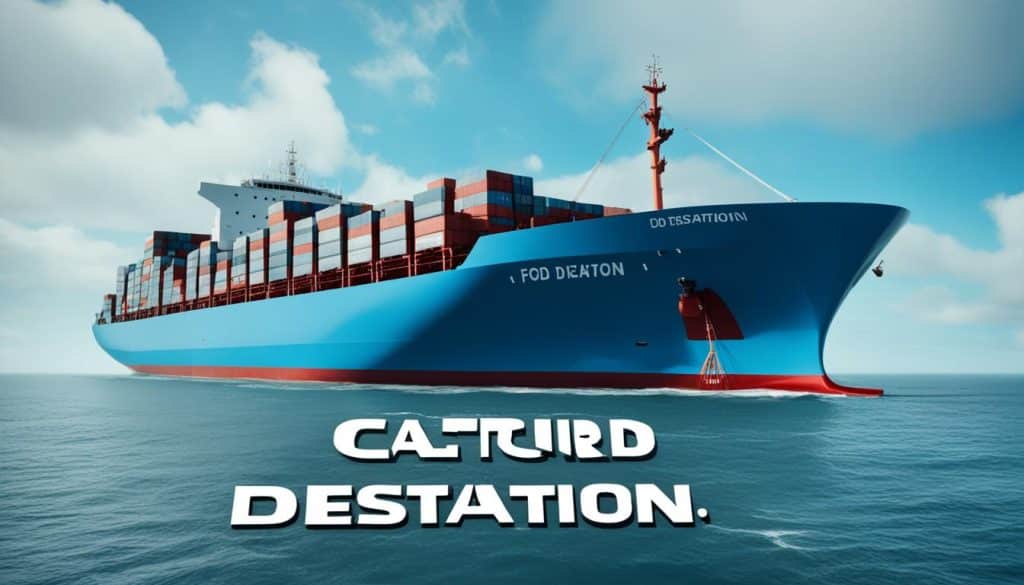Fob Destination Definition

In the world of international trade and logistics, the term "FOB destination" is a commonly used abbreviation that holds significant importance. This term, which stands for "Free On Board," defines a crucial point in the transportation and delivery process, impacting both the financial responsibilities and risk liabilities of the parties involved. Understanding the FOB destination definition and its implications is essential for anyone engaged in global commerce.
Unraveling the FOB Destination Definition

The FOB destination concept is a fundamental aspect of international trade agreements and shipping contracts. It signifies the moment when the ownership and responsibility for the goods transfer from the seller to the buyer. This transition occurs at a specified destination, typically a port or a designated delivery point, agreed upon by both parties.
When goods are shipped on an FOB destination basis, the seller is responsible for bearing the costs and risks associated with transporting the goods to the agreed-upon destination. This includes all expenses incurred during the journey, such as freight charges, insurance, and any necessary documentation fees. The seller remains liable for any damage or loss that may occur during transit until the goods reach the FOB destination.
Key Aspects of FOB Destination
The FOB destination term is a flexible concept that can be tailored to meet the specific needs of each transaction. Here are some key aspects to consider:
- Destination Selection: The FOB destination is chosen collaboratively by the buyer and seller. It could be a port, a warehouse, or even a specific geographic location. The chosen destination should be practical and feasible for both parties.
- Risk Transfer: The transition of risk from the seller to the buyer occurs at the FOB destination. This means that any losses or damages incurred after the goods reach the destination become the buyer's responsibility.
- Cost Allocation: While the seller bears the costs of transporting the goods to the FOB destination, the buyer typically takes on the expenses associated with unloading, handling, and any further transportation beyond the destination.
- Documentation: The seller is responsible for providing the necessary documentation to facilitate the smooth movement of goods to the FOB destination. This may include commercial invoices, packing lists, and other required paperwork.
| Key Term | Definition |
|---|---|
| FOB Destination | A shipping term indicating that the seller is responsible for transporting goods to a specified destination and bears the costs and risks until the goods reach that point. |
| Risk Transfer | The point at which the seller's liability for goods shifts to the buyer, typically occurring at the FOB destination. |
| Cost Allocation | The division of expenses between the seller and buyer, with the seller covering transportation costs to the FOB destination and the buyer taking on additional costs post-destination. |

The Practical Application of FOB Destination

The FOB destination concept is widely applied in various industries, particularly in the realm of international trade. Here’s a closer look at how it functions in practice:
International Trade and Logistics
In the context of global commerce, FOB destination is a crucial term that helps streamline the transportation and delivery process. It provides clarity on when the buyer takes ownership of the goods and assumes responsibility for any further costs and risks.
Imagine a scenario where a European manufacturer sells machinery to a buyer in the United States. The seller quotes the price on an FOB destination basis, with the destination being the buyer's warehouse in Chicago. This means the seller is responsible for arranging and paying for the shipping from the manufacturing plant in Europe to the warehouse in Chicago. Once the goods reach Chicago, the ownership and risk transfer to the buyer.
Risk Management
The FOB destination term is a powerful tool for risk management in international trade. By clearly defining the point of risk transfer, it helps mitigate potential disputes and misunderstandings between buyers and sellers. Both parties can plan their financial strategies and insurance coverage accordingly.
For instance, if a shipment of electronics is damaged while in transit to the FOB destination, it is the seller's responsibility to file a claim with the shipping company or insurance provider. However, once the goods reach the destination and are unloaded, any further damage or loss becomes the buyer's liability.
Cost Considerations
FOB destination also has significant implications for the financial aspects of a transaction. The seller must factor in the costs of transportation, insurance, and other expenses up to the FOB destination. This can impact the pricing strategy and profit margins of the seller.
On the other hand, the buyer needs to consider the costs associated with receiving the goods at the FOB destination. These may include customs duties, import taxes, and any additional transportation or handling fees required to move the goods from the destination to their final location.
Navigating the Future of FOB Destination
As international trade continues to evolve and become more complex, the FOB destination concept remains a cornerstone of shipping and logistics. However, with the advent of new technologies and evolving market dynamics, there are several trends and considerations to keep in mind:
- Technology Integration: The use of advanced technologies, such as blockchain and IoT devices, can enhance the tracking and monitoring of goods during transit. This can provide real-time visibility and improve the efficiency of the FOB destination process.
- Sustainable Practices: With a growing focus on sustainability, there is a shift towards more eco-friendly shipping methods. This may impact the choice of transportation modes and the overall cost structure associated with FOB destination transactions.
- Trade Agreements: The negotiation and implementation of international trade agreements can significantly influence the FOB destination concept. These agreements may introduce new regulations, tax structures, or customs procedures that impact the costs and risks associated with FOB destination transactions.
- Risk Assessment: As global supply chains become more intricate, there is a growing need for sophisticated risk assessment and management strategies. This includes evaluating political, economic, and environmental factors that could impact the safe delivery of goods to the FOB destination.
Frequently Asked Questions
How does FOB destination differ from other shipping terms like FOB origin or CIF destination?
+FOB destination differs from FOB origin in that FOB origin places the responsibility and costs of transporting the goods on the buyer, whereas FOB destination keeps those responsibilities with the seller until the goods reach the specified destination. CIF destination, on the other hand, includes the cost of insurance and freight in the purchase price, providing more protection to the buyer.
What happens if the goods are damaged or lost before reaching the FOB destination?
+If the goods are damaged or lost before reaching the FOB destination, the seller remains responsible and liable for those losses. It is the seller’s duty to ensure the safe delivery of the goods up to the specified destination.
Can the FOB destination be changed after the initial agreement?
+In most cases, changing the FOB destination after the initial agreement is not recommended. Such a change could impact the costs, risks, and responsibilities associated with the transaction. It’s essential to clearly define the FOB destination in the initial contract to avoid potential disputes.
How does FOB destination impact the pricing strategy for sellers and buyers?
+For sellers, FOB destination pricing requires them to factor in the costs of transporting goods to the specified destination. This can impact their profit margins. Buyers, on the other hand, must consider the costs associated with receiving the goods at the FOB destination, including potential import taxes and transportation fees.


